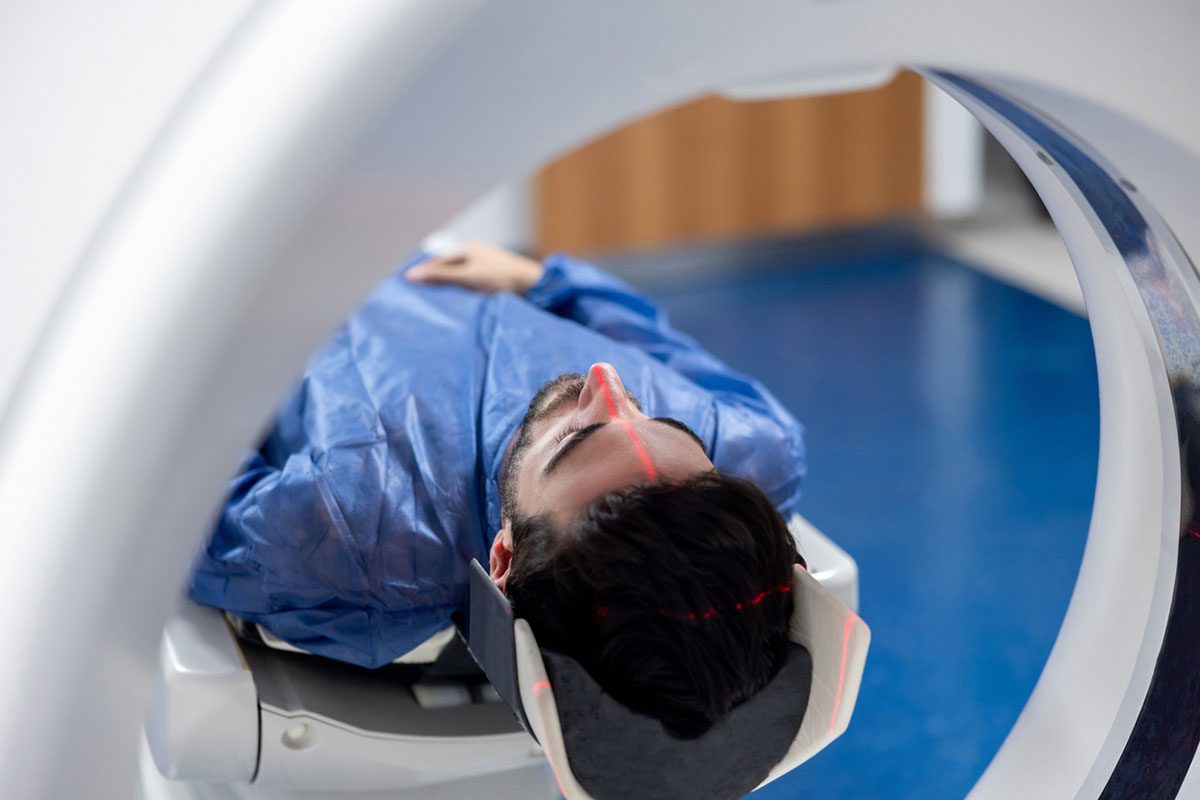
Reversible Carotid Artery Stenosis in a HIV-Positive Patient:
Is It Related to Vasculitis?
Patients who are positive for human immunodeficiency virus (HIV) may present with neurologic and psychiatric symptoms. Aneurism, stenosis, and vasculitis are the results of vascular involvement of HIV. In this report, we present the case of a HIV-positive patient with a history of narcotic substance abuse who was diagnosed with bilateral intracranial carotid artery stenosis and responded to steroid treatment.
Case Report
A 41-year-old HIV positive man was consulted by the neurology doctor while staying in the infection diseases clinic with a pulmonary infection. He was taking antibiotic treatment and drugs related to HIV during this period. During his neurologic examination, the patient demonstrated a confused state with partial responses to questions, his speech was limited to sporadic words, and his comprehension was restricted to simple instructions. His neurologic condition was consistent with encephalopathy. We learned that the patient had used "poppers" before admission, which is a slang term for alkyl nitrites. Users inhale the substance, which relaxes involuntary smooth muscles. However, the patient’s clinical picture at presentation was not thought to be associated with this substance because its effect is very short, with a maximum elimination time of 2 hours. The patient had used the substance before admission to the hospital.
Cranial magnetic resonance imaging and lumbar puncture showed no pathology. An electroencephalography recording showed generalized slowing. Vasculitis markers, syphilis test, and other infectious markers were negative. Carotid magnetic resonance angiography was performed to eliminate the possibility of aneurism or stenosis in large blood vessels, which can be seen in patients with HIV. It was noticed that the patient had severe bilateral long segment stenosis in the intracranial portion of the internal carotid arteries (Figure 1A). The clinical status of the patient may have been related to hypoperfusion of the brain parenchyma. The patient was diagnosed with HIV vasculitis, and 1,000-mg/d intravenous (IV) methylprednisolone therapy was initiated after confirming he had sufficient CD4 lymphocytes for administering pulse steroid therapy. After 5 days of IV therapy, he was switched to an oral form of the drug with subsequent stepwise decreasing doses. Carotid magnetic resonance angiography was repeated after 1 month, which demonstrated complete recanalization of the previously stenotic vessel (Figure 1B). The clinical status of the patient improved during this period.
Discussion
We describe a case of encephalopathy-associated temporary carotid stenosis possibly related to HIV. Neurologic complications related to HIV include meningitis, meningoencephalitis, inflammatory polyneuropathy, myelopathy, spinal cord involvement-related myopathy, and HIV dementia. Cerebral infarctions in HIV-positive patients are observed in 0.5%-7% of clinical presentations but were found in 19% to 34% of patients in autopsied series.1,2 Many neurologic syndromes occur when the CD4 lymphocyte count is < 200 mL.3 The incidence of vasculitis in HIV-positive patients was reported as approximately 1%.2 The underlying mechanisms related to stroke in HIV patients are vasculopathy, cardioembolism, opportunistic infection or neoplasia, coagulopathy, and aneurism-related hemorrhage. Large vessel occlusion causing stroke is rarely seen in patients with HIV. Vasa vasorum or periadventitial vessel involvement may cause aneurism or stenosis by damaging vessel walls.4,5
Disease with underlying pathology related to inflammatory or immunologic processes responds rapidly to steroid treatment. In HIV-positive patients, immunosuppressant or corticosteroid treatment is not indicated in treatment guidelines; however, supporting data are present in a case report and case series in this regard.6
Vasculitis may affect vessels of any size, thus carrying a risk of damage to all organs, and large arteries in particular may lead to life-threatening conditions.4 Accordingly, vessel imaging in HIV-positive patients is important if there is a suspicion of vessel involvement.
Published online: August 29, 2019.
Potential conflicts of interest: None.
Funding/support: None.
Patient consent: Consent was not received because the patient died of pneumocystis carinii infection in the following months. Information has been de-identified to protect anonymity.
REFERENCES
1.Croucher A, Winston A. Neurological complications of HIV. Medicine. 2013;41(8):450-455. CrossRef
2.Gillams AR, Allen E, Hrieb K, et al. Cerebral infarction in patients with AIDS. AJNR Am J Neuroradiol. 1997;18(8):1581-1585. PubMed
3.Sico JJ, Chang CC, So-Armah K, et al; Veterans Aging Cohort Study. HIV status and the risk of ischemic stroke among men. Neurology. 2015;84(19):1933-1940. PubMed CrossRef
4.Manuel A, Victório T, Gomes C, et al. Vasculitis: an unusual manifestation in an HIV-infected patient. Braz J Infect Dis. 2015;19(4):439-441. PubMed CrossRef
5.Benjamin LA, Bryer A, Emsley HC, et al. HIV infection and stroke: current perspectives and future directions. Lancet Neurol. 2012;11(10):878-890. PubMed CrossRef
6.Bermel C, Sp×¼ntrup E, Fink G, et al. Stroke in an adult with HIV infection due to carotid artery stenosis successfully treated with steroids: HIV-associated arteritis? J Neurol. 2009;256(9):1563-1565. PubMed CrossRef
aDepartment of Neurology, Marmara University, School of Medicine, Istanbul, Turkey
bDepartment of Radiology, Marmara University, School of Medicine, Istanbul, Turkey
*Corresponding author: Ipek Midi, Prof Dr, Department of Neurology, Marmara University, School of Medicine, Fevzi Cakmak Mah, Muhsin Yazicioglu Cad, No 10, Istanbul, Pendik 34876 Turkey ([email protected]).
Prim Care Companion CNS Disord 2019;21(4):18l02296
To cite: Midi I, Geyushova S, Babashova L, et al. Reversible carotid artery stenosis in a HIV-positive patient: is it related to vasculitis? Prim Care Companion CNS Disord. 2019;21(4):18l02296.
To share: https://doi.org/10.4088/PCC.18l02296
© Copyright 2019 Physicians Postgraduate Press, Inc.
Enjoy this premium PDF as part of your membership benefits!






